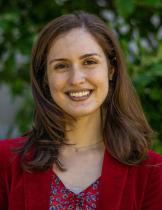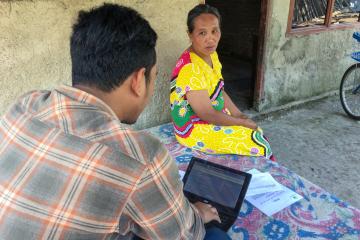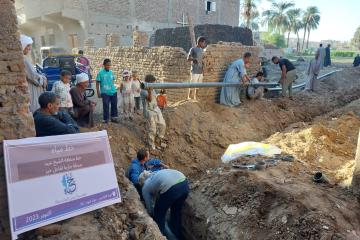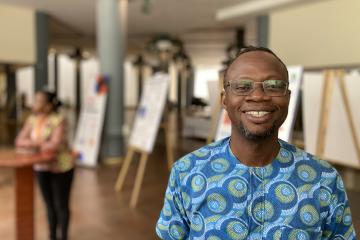
Celebrating 20 years of J-PAL and looking to the future
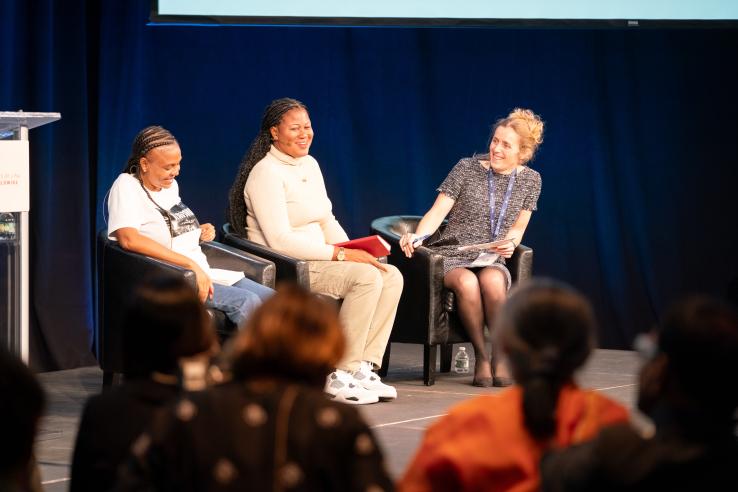
We opened our doors in 2003 with a mission to reduce poverty by ensuring that policy is informed by scientific evidence. In our first decade, we set out to build a global infrastructure for rigorous research in new contexts. In our second decade, we worked with hundreds of partners to transform how evidence is applied to policy change and strengthen researcher and implementer capacity—all with the goal of improving lives around the world.
On November 3, we hosted an event at MIT in Cambridge, MA, that brought together a diverse group of partners to reflect on two decades of progress and look to the future. The event showcased perspectives of people engaging directly with evidence-informed policies, featuring program participants and implementing partners sharing their stories and their reflections on J-PAL at 20.
At the event, government and NGO partners, funders, and researchers in the J-PAL network joined our leadership, staff, and alumni for a series of short panel sessions and talks, followed by small-group discussions on pressing issues facing the field of international development and social policy themes, and concluding with a fireside chat with J-PAL directors. The sessions provided platforms for listening, connecting, and charting a path forward for the next decade.
Learning from global voices
The morning agenda featured sessions led by evaluation participants, activists, and global thinkers who shared perspectives and transformational stories from their journeys of social impact.
Links to video recordings of these sessions are coming soon—stay tuned.
The journey to J-PAL at 20
Hassan Jameel, vice chairman of Community Jameel, kicked off the day with remarks on the ambitious vision shared by Mohammed Jameel, Abhijit Banerjee, and Esther Duflo.
“Sometimes when we look back and see the Nobel Prize, seven offices around the world, hundreds of staff and affiliated professors, 600 million lives touched, it can be tempting to think that this was all going to turn out this way,” Hassan said.
“But the courage and the vision of that small group of people and a lot of hard work by J-PAL's staff, partners, and researchers are truly the bedrock of these towering achievements.”
J-PAL Director Esther Duflo (MIT) followed Hassan with brief remarks setting the stage for the day.
“In a typical birthday celebration, we would reflect on the past and say how wonderful we are,” Esther said. “And I think we are pretty wonderful and awesome, but I also think we kind of know that, and maybe it's not necessary to spend another few hours to repeat it. So what I really wanted to do this morning is to step back.
"There are not going to be many researchers on stage today except in moderating capacity. We keep talking about the movement—the movement is made of people who experienced poverty, of people who work directly with people who experience poverty, and I want to spend the morning hearing from them. …My hope is that it is going to give us, collectively in this room, both the energy and the charge for what we need to do in the next one month, one year, ten years, twenty years, and so on.”
High-quality education for all
In this session, speakers reflected on their frontline experiences leading transformative education initiatives. Pratham’s Faiyaz Ahmed, Rukmini Banerji, and Nuzhat Malik discussed unexpected challenges and successes implementing Teaching at the Right Level in India, and J-PAL affiliated professor and Health sector Co-Chair Pascaline Dupas (Stanford) moderated a conversation with Gifty Amaney and Stellina Pana, both field consultants at Innovations for Poverty Action, on expanding access to girl’s secondary education in Ghana.
The session wrapped up with a video talk from Deborah Danso, a pharmacy technician in Ghana, on the role that education played in her life as the recipient of a scholarship program evaluated by Pascaline and her colleagues.
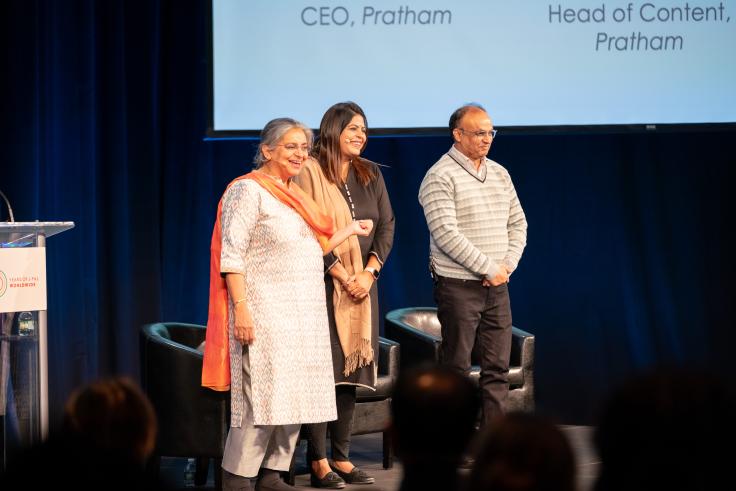
Reframing the narrative
Photographer and filmmaker Ami Vitale spoke about her journey from being a war photographer covering conflicts around the world to documenting wildlife and environmental stories in support of environmental conservation.
“I realized these are the stories that really give us the sense that those caught in the conflicts don't stop dreaming and hoping for a better future. It's often in the face of our greatest challenges that humanity, ingenuity and creativity often can light a path forward… what happens next is in all of our hands,” Ami said.
“When I look out at all of you, I realize it is an impressive group of people who are used to pushing the envelope. And if the people in these stories do so much with just resilience and imagination and ingenuity, what are we all going to accomplish together?”
Poverty, the environment, and climate change
J-PAL affiliated professor and Environment, Energy, and Climate Change sector Co-Chair Kelsey Jack (UC Santa Barbara) introduced this session, which featured conversations on responding to the adversities created by climate change with Ami Vitale; James Mwenda, a Kenyan conservationist and entrepreneur; and Gregory Chen, managing director of BRAC’s Ultra-Poor Graduation Initiative.
Hindou Oumarou Ibrahim, president of the Association for Indigenous Women and Peoples of Chad, spoke via video on the impact of climate change on people experiencing poverty in central Africa, emphasizing the importance of global support for locally-grounded solutions.
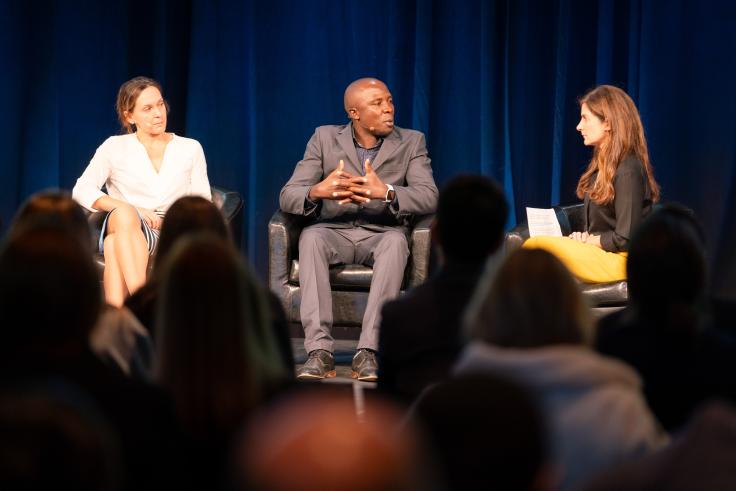
My epic failures
J-PAL Director Ben Olken (MIT), co-chair of J-PAL's Social Protection sector, spoke about the importance of risk-taking in generating successful research that informs real-world policies and programs.
The research process is much more iterative than you think," Ben said. "Every project that you try doesn't work, and actually, it shouldn't work. We should be going through the process of making sure what we find actually is connected to the realities on the ground, that it's practically feasible, and that it's consistent with the policies that we're trying to do. Having that flexibility and adaptation is really important. If we aren't failing, we're probably not taking enough risks.”
Poverty amidst plenty: The good fight in the United States
Janti Soeripto, CEO of Save the Children US, moderated a conversation on fighting poverty in the United States with Maryann Broxton, main representative to the United Nations, International Movement ATD Fourth World, and Ashleigh Stocton, volunteer community lead with Save the Children Action Network (SCAN). Maryann spoke about the challenges of measuring poverty in the United States and lessons taken from her experience conducting poverty research.
Ashleigh discussed SCAN’s work in advocating to US elected officials for children to have a healthy start in life.
“Because children don't have a voice, they can't go and talk to our elected officials,” Ashleigh said. “So we have to be that voice for them.”
Transforming communities from the inside out
Marcelo Rocha, known as DJ Bola, is the founder of A Banca, a youth organization in São Paulo, Brazil and joined the event via video to share his work on community-led initiatives in Brazil and the importance of building dialogues between peripheries and city centers.
Working with “quacks:" The challenges of unregulated health care
Abhijit Chowdhury, professor and chair of Hepatology at the Indian Institute of Liver and Digestive Sciences, and J-PAL affiliate Jishnu Das (Georgetown University) discussed lessons from their work training informal health care providers in India.
In a video interview, Tarun Chakraborty and Tanmay Majumda, informal health care providers in West Bengal, shared their commitment to providing high-quality care and their interest in learning more up-to-date health care practices.
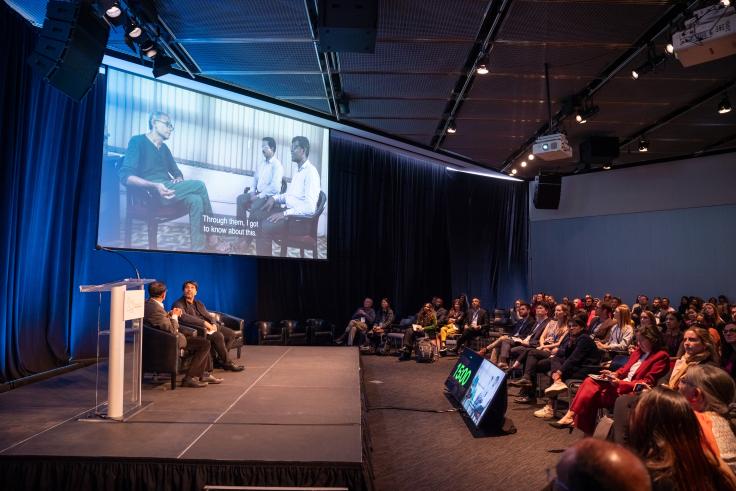
Afternoon breakouts: Mapping a vision for the future
In the afternoon, breakout discussions focused on specific thematic areas. J-PAL academic leads gathered with close partners to discuss emerging priorities related to corporate responsibility, intersections between agriculture and climate change research, opportunities for scaling child health interventions, fostering policy change and the scaling of promising programs, and the progress and next steps of J-PAL’s Social Protection Initiative.
In the session on agriculture and climate change, anchored by Kelsey Jack and Agriculture sector Co-Chair Tavneet Suri (MIT), participants discussed critical areas in climate policy that could benefit from more robust evidence. At the intersection of climate and agriculture, adaptation best practices for smallholder farmers in low- and middle-income countries was a key point, particularly in light of emerging international trade regulation like Carbon Border Adjustment Mechanisms and laws limiting trade from deforested land.
Two simultaneous panel sessions focused on insights related to artificial intelligence and experimental research methods.
AI: Emerging challenges and opportunities
This panel brought together thought leaders to discuss the likely impacts of evolving AI technology on social and economic issues including productivity, growth, and labor markets. There was particular focus on AI’s evolving role in education and health in high-, middle-, and low-income economies. J-PAL Global Executive Director Iqbal Dhaliwal moderated the panel, which featured J-PAL affiliate David Autor (MIT); Gita Gopinath, first deputy managing director of the IMF; Brigitte Hoyer Gosselink, director of product impact at Google.org; and Secretary S. Krishnan of India’s Ministry of Electronics and Information Technology.
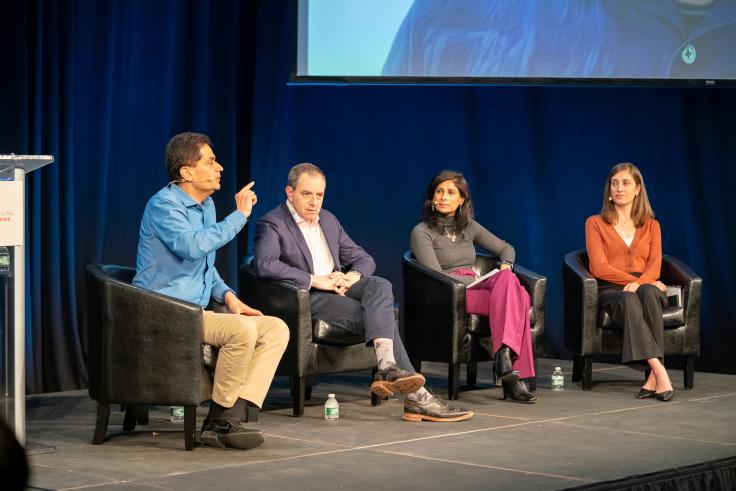
Innovations in RCT methods and perspectives for the next decade
This session convened experts to discuss recent developments in RCT methods. J-PAL affiliate and Chair of J-PAL’s Research vertical, William Parienté (Université Catholique de Louvain), introduced the session and moderated discussions with Poppy Widyasari, associate director of research at J-PAL Southeast Asia; Dean Karlan (Northwestern); and J-PAL affiliates Seema Jayachandran, co-chair of J-PAL’s Gender sector (Princeton) and Craig McIntosh, co-chair of J-PAL’s Agriculture sector (University of California, San Diego).
Speakers discussed developments in the analysis and design of rigorous research, innovations in measurement and data accessibility, and advances to improve the comparability and generalizability of randomized evaluations.
The future of J-PAL and experiments in social policy
The afternoon breakouts were followed by remarks from Bengt Holmström, professor emeritus (MIT) and former chair of MIT’s Department of Economics.
Bengt said, “It is really terrific to be here because I've seen J-PAL from the beginning, and I have been excited about J -PAL from the beginning… I did forecast it would be a success, but I did not forecast it would be this dramatic and fantastic,” continuing on to commend the passion and focus of J-PAL’s founders and the organization’s ability to scale its model successfully.
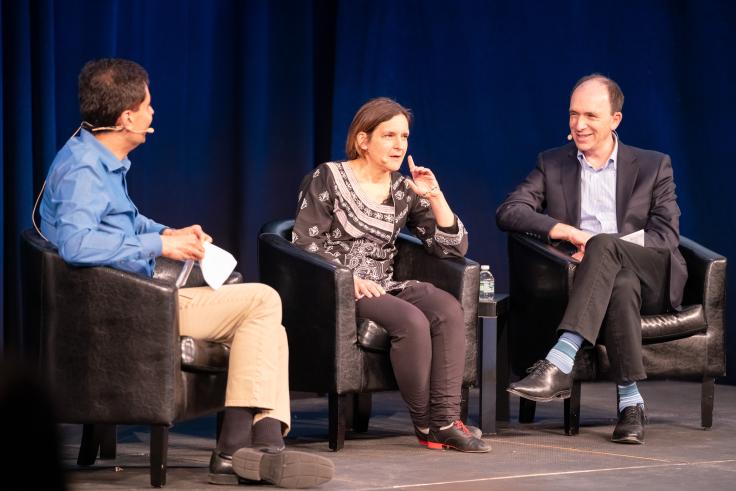
Following Bengt’s remarks, Iqbal Dhaliwal, Esther Duflo, and Ben Olken reflected on our past decade of work, their vision for J-PAL going forward, and discussed emerging topics and challenges.
Discussing highlights of J-PAL’s last decade, they noted the expansion of J-PAL’s researcher network in both numbers and diversity and the vast expansion of government partnerships and policy engagements. They also noted the strength of J-PAL’s alumni network, with former staff moving on to roles in government, foundations, and civil society, expanding and elevating evidence-driven policymaking beyond J-PAL.
Esther spoke about the importance of expanding education and training to reach the next generation of researchers and policymakers.
“With demand for evidence continuing to grow, the world needs many more people with the capacity, ambition, and opportunity to make change,” Esther said.
As J-PAL looks to our next decade, we’re exploring new ways to equip people around the world with the tools to innovate, test, and scale—more often than not with no direct J-PAL involvement. The work ahead requires a truly collaborative effort to engage new audiences and partners, and work with existing partners in new ways, to breathe life into this vision, help shape it, and put it into action.
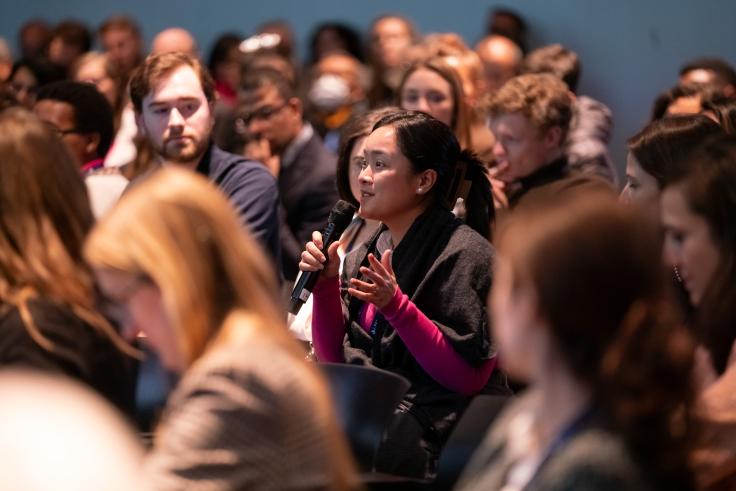
The way forward
The day wrapped up with a shared call to action by MIT Corporation Chair Mark Gorenberg, who spoke about J-PAL’s “straightforward but profound” mission and emphasized J-PAL’s leading role in MIT’s efforts to empower vulnerable communities and help society combat climate change.
We come away from this event inspired and grateful for the opportunity to connect with many people in our broad community, and eager to engage with more of you in the year ahead.
Videos of the above sessions will be posted on our YouTube channel in the coming weeks—stay tuned! In the meantime, subscribe to our eNews to learn more about emerging priorities and new directions as we enter our third decade.
